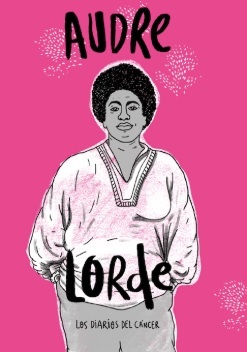As a breast cancer patient, Audre Lorde was mistreated by doctors and medical professionals. Rather than an isolated incident, Lorde’s experiences reflect the broader racism, sexism, and homophobia that many experiences in the medical industry. In this blog post, I show how Lorde’s queer community became a crucial support structure that helped her navigate these traumatic and horrifying experiences. While she lamented the fact that she had no models to learn from, she used her experiences to write The Cancer Journals manifesting herself as a role model for individuals, such as queer women of color patients, who were in need of guidance.
Lorde recorded her mistreatment in The Cancer Journals. Lorde equated her experience of breast removal to that of being removed by her mother, “The pain of separation from my breast was at least as sharp as the pain of separating from my mother” (26). This sentence elaborates on how her pain was a physical and emotional experience that left her vulnerable. Not many patients received the same attention or care that was rightly needed post operations. Lorde touches on her personal experience with being neglected basic utilities and care. Lorde writes, “I yelled and screamed and complained about the cold and begged for extra blankets, but none came” (27). For recovering patients, it’s essential for medical staff to pay attention and provide the necessary needs, not to ignore them and refuse them care. Like many patients, Lorde was scared after waking up from her operation. When the medical staff refused to give Lorde attention, this was a sign of neglect, which could have been dangerous for her health.
As Lorde was in the hospital battling breast cancer, her friends gave her hope through solidarity. Lorde writes, “I remember their faces as we shared the knowledge and the promise of shared strengths in the trial days to come. In some way, it was as if each of the people I love most dearly came one by one to my bedside where we made a silent pledge of strength and sisterhood no less scared than if it had been pledged in blood rather than love (28).” Lorde had a support system that not only comforted her but empowered her. Lorde’s work has shown how queer womxn of color have overcome obstacles that challenge the predominant white heterosexual cig-gender patriarchal society, by maintaining a fundamental foundation of solidarity. Growing up, Lorde did not submit to some of her family’s cultural and traditional norms, nor was she accepted as a Black individual growing up in NYC. Once Lorde graduated High School, she moved out of her family’s home, “And we duplicated or reached for with each other some kinds of networks because we knew that it meant survival.” (A Litany for Survival). Decades have passed, and Lorde still had her fundamental community of queer women of color through her journey battling cancer.
As Lorde was recovering from her operation, she was encouraged to wear a prosthetic breast, which, for her, reflected a patriarchal perspective on women’s bodies. After her operation, Lorde interacted with a white blonde woman from the Reach for Recovery program. The white woman had good intentions. She assured other women going through post-mastectomies, just as Lorde had, that “you are just as good as you were before because you can look exactly the same (42).” However, this mindset was constructed by the patriarchy, emphasizing what a woman’s body should look like, normalizing breasts to equate womanhood. Lorde refused to wear the prosthetic to refute the patriarchal stance for other breast cancer survivors who shared a similar mindset. She defied norms and took action in her own way.
After her operation, the doctors, nurses, and the woman from Reach for Recovery all assumed that Lorde was straight. Lorde did not feel comfortable sharing her sexual orientation with this woman, and she withheld her questions about intimacy. Lorde writes, “I ached to talk to women about the experience I had just been through, and about what might be to come, and how we’re doing it and how they had done it. But I needed to talk with women who shared at least some of my major concerns and beliefs and visions, who shared at least some of my language. And this lady, admirable though she might be, did not” (42). Lorde yearned for a mentor or medical professional who could guide her through the process of her recovery, “Where are the models for what I’m supposed to be in this situation (29).” Having an experienced individual such as a woman, queer, black, and perhaps similar ideologies could have comforted Lorde during her battle against cancer. There were many things she wanted to say and ask the medical professionals or strangers from resource groups, but she remained silent due to the fear of judgment. In the way of rendering her voice, she tried to protect herself in the unknown territory such as the medical institution. Lorde had experienced racism in her life, and she knew medical racism would be no different.
During her time in the hospital, Lorde experienced medical racism. According to Mclemore, “women of color experience discrimination, racism and disrespect in healthcare encounters and that they believe this affects their health…” Medical racism is one aspect of systemic racism: “racism expressed in the practice of social and political institutions (Institutional Racism).” If Lorde had the opportunity to receive guidance from a black woman or a queer womxn of color, she could have felt comfortable asking her genuine questions without feeling insecure with her true identity. This issue tends to happen countless times where women of color are unable to address their issues to the medical institutions due to the possibility of getting disregarded. Medical racism prevents queer/womxn of color from receiving the same quality of health care as heterosexual white men do. This has always existed with American society, disregarding women’s physical and mental health.
By maintaining a diary, Lorde was able to find a safe space where she could rawly vent her experiences. Her experiences enlightened her audience on the mistreatment of certain individuals being treated in hospitals, specifically the mistreatment of queer women of color. There were no safe spaces in hospital environments where queer women of color felt comfortable being out and asking their questions. This was due to their fear of judgment and possible discrimination. However, Lorde’s journals have been impactful for individuals needing guidance as someone who has gone through the stages of battling cancer.
Throughout her life, Audre Lorde faced many challenges as a minority woman and a breast cancer survivor. In her literature, she mentions the idea of having a mentor or a role model she could reconcile with in regards to her past inexperienced self. After overcoming the obstacles life has thrown at her, Lorde discovered unorthodox methods to battle and survived the issues at hand. Thus the role model Lorde sought out when she was younger, she manifested and became a leader of guidance. The way Lorde conveys her poetry with unapologetic anger is the same fight that is rooted in her existence when she comes face to face with an obstacle, whether it be the patriarchy or breast cancer; she is a warrior.
Work Cited:
A Litany for Survival: The Life and Work of Audre Lorde. New York, NY: Third World Newsreel, 1996.
“Institutional Racism.” Wikipedia, Wikimedia Foundation, 23 Apr. 2020, en.wikipedia.org/wiki/Institutional_racism.
Lorde, Audre. The Cancer Journals. San Francisco :Aunt Lute Books, 1997.
Mclemore, Monica R., et al. “Health Care Experiences of Pregnant, Birthing and Postnatal Women of Color at Risk for Preterm Birth.” Social Science & Medicine, vol. 201, 2018, pp. 127–135., doi:10.1016/j.socscimed.2018.02.013.
Mclemore, Monica R., et al. “Health Care Experiences of Pregnant, Birthing and Postnatal Women of Color at Risk for Preterm Birth.” Social Science & Medicine, vol. 201, 2018, pp. 127–135., doi:10.1016/j.socscimed.2018.02.013.

